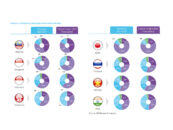According to the World Payments Report 2018 produced by Capgemini and BNP Paribas, global non-cash transaction volumes grew at 10.1% in 2016 to hit 482.6 billion in value, with China contributing to 25.8% of that growth.
When it comes to e-wallets specifically, China alone contributes to 16.3 billion transactions while the rest of the world accounts for remaining 25.5 billion transactions.
China is predicted to help it overtake the USA in non-cash transaction volumes by 2021, in parts due to the American market’s slowness to adopt new payments technologies that Chinese companies are more open to.
With that being said, we came in second to Russia in terms of growth rate, which recorded an increase in transaction numbers of 36.5%, to reach 17.3 billion transactions due to initiatives including financial inclusion programs, regulations to cap cash payments, and the introduction of the National Payment Card System (NPCS). This is a significant percentage above China’s 25.8% and 48 billion transactions.
China’s rapid growth, in parts, perhaps owes to China accounting for 40% of global e-commerce transactions. China’s transactions through unconventional e-platforms reached 26.1 trillion yuan last year, up 19.8 percent from the previous year

Image Credit: World Payments Report 2018
China’s Cashless Economy Heading in The Right Direction
The World Payments Report 2018 estimates that between 2016 to 2018, the CAGR of worldwide non-cash transactions will be 12.7%. While China alone is estimated to account for 40% of global retail e-commerce, the highest growth rate is anticipated to come from developing regions like Latin America, CEMEA, and Emerging Asia.
Regulatory measures introduced by China to regulate e-wallet operators have also significantly reduced the growth of non-cash transactions in the country, though we see this as a necessary evil in order to care for the welfare of the China populace.
However, the slowdown in non-cash use growth from China could simply mark a maturity point and an already high adoption rate from the populace. With most of the country on board, huge swaths of data collected from the use of trackable payments methods could instead pave the way towards new fintech developments, particularly those that could help the less well-off to access financial services, or services to improve financial health.
These are some of the intended solutions from the global movement towards open banking APIs. While China has yet to express much interest in hopping aboard the global trend, the nation could instead see value in adopting the same principles, but forge forward on its own path.
Featured image edited from Freepik









